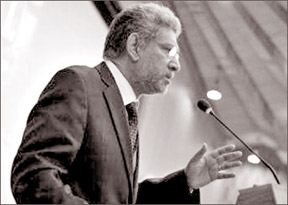Buddha’s teachings inspire humanistic and universalist politics
Closing remarks by Ambassador Dayan
Jayatilleka at the UNESCO international scholarly symposium on ‘The
contribution of the Buddha’s teachings to Universality, Humanism and
Peace’, in commemoration of the 2600th anniversary of the Buddha’s
Enlightenment held in Paris, May 20, 2011
“This effort of ASPAC (the Asia-Pacific Group) and UNESCO was an
exercise in intervention. We were hoping to intervene against two
syndromes. One which (Edward) said called ‘Orientalism’, and the other,
its reverse, which we may term ‘Occidentalism’.
The first entails the notion that the West is the preserve of
philosophy and the East is the domain of exotic cultures, and that
‘universality’ originated from and flows from West to East.
Counter-posed to this Eurocentric vision is its inversion: the Eastern
idea of the West as the site of a mechanistic materialism and a tawdry
consumerism, whereas the East is the realm of the metaphysical and the
spiritual.
I think we have made a dent in those two myths today.
Buddha’s teachings
This symposium has been an occasion for learning; I think we all
learned something. I think that our thinking, our perceptions have been
impacted upon by this seminar and one cannot expect more from any
symposium.
|

Ambassador Dayan Jayatilleka addressing the UNESCO
international
scholarly symposium. |
We addressed the question of the contribution of the teachings of the
Buddha’s to universality, humanism and peace, and I think we have found
suggestions in the answers.
The teachings of the Buddha contributed to universality in two
senses. Firstly, the problem, of suffering, and secondly, the aim, of
the cessation of suffering. What can be more universal than that?
The teachings of the Buddha contributed to humanism. May I say that
Buddhism is an extended or expanded humanism? What could be more
humanistic than the notion “may all living-beings be happy”? This
encompasses not only human beings but as mentioned before, in the
discussion, the animal world and of sentient beings.
Ethnic identity
As far as the contributions of the Buddha’s teachings to peace goes
and here I am also thinking about the question raised about Buddhism and
politics - may I suggest that there are two notions in Buddhism which
impact on politics and can inspire a different kind or form of politics:
one is the release or the emancipation from excessive attachment. In our
part of the world and in the world as a whole, one may trace wars, which
“originated in the minds of men”, to an excess of attachment to
territory, to narrow ethnic identity, to power structures, to the
wielding of power, to hegemony and dominion.
Surely, no true Buddhist or society which claims to be Buddhist
should persist in that excessive attachment to one narrow ethnic
identity or one piece of territory, or to one hierarchy of power or
religions? Aligned to this is the notion of the Middle Path which is
akin to or antecedent of the Socratic notion of the Golden Mean.
The threading of the Middle Path, the avoidance of extremes also
contributes to a far more humanistic and universalist politics. I think
this is what we have gathered from today’s symposium.
I think this is a contribution that Buddhism makes to a new paradigm
of politics. I have a too long list of persons and institutions to
thank, but may I say that the Ambassadors of India, China, Japan and I,
we got together; we talked about this and then won the support and the
ready endorsement of the ASPAC group who actively supported us.
Pakistan, Bahrain, Afghanistan and so many other countries in our group
joined the venture and strengthened us.
Different dimensions
We had a very ready and willing partner in Director General Irina
Bokova and I think her contributions today has been of absolute
fundamental importance. I thank her. And of course, Asst Director
General Madam Alvaro Pilar-Lazo and Pilar’s people, of the Human and
Social Sciences division of UNESCO, and Dr. Davidson Hepburn, President
of UNESCO’s General Council, for moderating this panel, and the
distinguished Indian delegate Dr. Karan Singh, for willing to stay over
and co-chair this symposium; the ASPAC group and its head, the
Ambassador of Thailand for the generous support and patronage extended
to us.
And of course above all, I must thank the distinguished panelists -
the speakers who approached the subject in different ways and different
dimensions - but all of whom, coming from many parts of the world,
helped us expand our consciousness that much more. I thank you all very
much.” |



